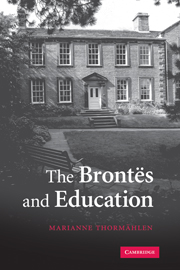15 - Liberty and responsibility
Published online by Cambridge University Press: 22 September 2009
Summary
In view of the lofty status of originality in the nineteenth century, it might have seemed natural to place it in opposition to docility, at the expense of the latter. The late twentieth century taught Humanities scholars to think in terms of binarisms and tensions between contradictory phenomena, and anybody schooled in that tradition would instinctively pose one concept against the other, studying the oscillations in value between the opposite poles.
There is of course nothing inherently wrong with this mental habit; it has helped Brontë critics uncover plenty of complexity and depth beneath apparently – and deceptively – simple representations in texts by and on the Brontës. It has, however, encouraged too great attentiveness to dichotomies and aporias and too little to reconciliations and resolutions. To stay with the docility concept for a moment, a person who is teachable under appropriate circumstances demonstrates that he/she has the sense to acknowledge another person's superior knowledge and skills. Such acknowledgement is evidence of sound judgement allied to modesty. That combination is a strength, not a weakness, and the Brontë fiction shows it to be a strength promoted by a good education. Caroline Helstone is thus misguided in being a docile pupil of Hortense Moore's, not realising, unschooled as she is owing to her uncle's neglect of her education, that her cousin's authority is spurious.
- Type
- Chapter
- Information
- The Brontës and Education , pp. 209 - 214Publisher: Cambridge University PressPrint publication year: 2007



